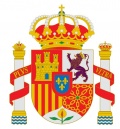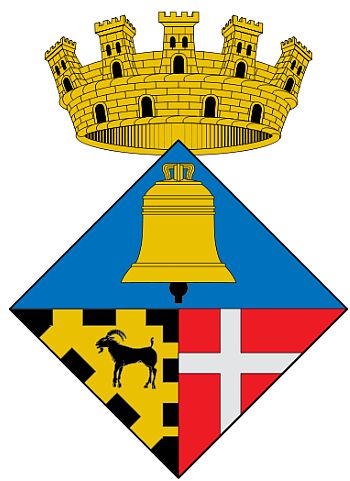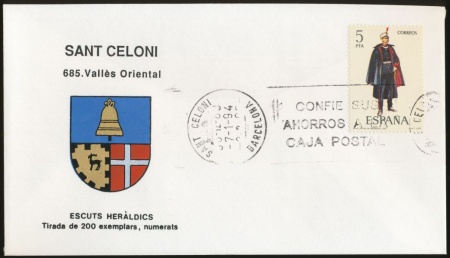Sant Celoni: Difference between revisions
Jump to navigation
Jump to search
Knorrepoes (talk | contribs) m (Text replacement - "px|Escudo de {{PAGENAME}}]]" to "px|Escudo de {{PAGENAME}}/Arms (crest) of {{PAGENAME}}]]") |
Knorrepoes (talk | contribs) m (Text replacement - "|'''English''' ↵| {{blazon wanted}}" to "|'''English''' | blazon wanted") |
||
| Line 15: | Line 15: | ||
|- | |- | ||
|'''English''' | |'''English''' | ||
| | | blazon wanted | ||
|} | |} | ||
Revision as of 10:49, 7 April 2023
Spanish heraldry portal
This page is part of the Spanish heraldry portal |
Heraldry of the World |
|
Civic heraldry:
|
Other heraldry: |
SANT CELONI
Region : Catalonia
Province : Barcelona
| Catalan | Escut caironat truncat i semipartit: 1r d'atzur, una campana d'or batallada de sable; 2n d'or, una cabra arrestada de sable i bordura de 8 peces també de sable; i al 3r de gules, una creu plena d'argent. Per timbre, una corona mural de vila. |
| English | blazon wanted |
Origin/meaning
These arms have been officially granted on 18th October 1983.
The bell is the traditional sign on the arms of the town. Sant Celoni was the centre of a Hospitaller command from 1151 to 1405, when it was bought by Bernat IV of Cabrera. We can see here the canting arms of the viscounty of Cabrera (a Catalan "cabra" being a goat) and the cross of the Hospitaller knights.
| The arms on an heraldic cover (1990s) |
Contact and Support
Partners:
Your logo here ?
Contact us
© since 1995, Heraldry of the World, Ralf Hartemink 
Index of the site
Literature : Image taken from Wikipedia; background from Enric Fontvila, Barcelona.













